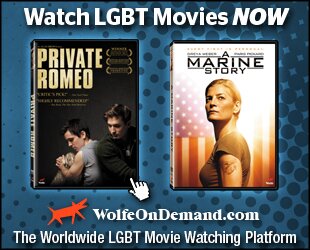My Two Dads
A Sailor’s Story
By Neal Simpson
 At first glance, Justin Ossola seems like most other Navy lieutenants I’ve met. Clean cut, dark hair and physically fit. A 2006 graduate of the U.S. Naval Academy (and recently on the staff), Ossola lives in Annapolis with his wife Nicole and their nine-month-old son. He is currently working on his MBA at Georgetown and recently completed his service obligation in the Navy. By all accounts, Justin’s life has been quite a success—not too bad for a straight guy with two gay dads.
At first glance, Justin Ossola seems like most other Navy lieutenants I’ve met. Clean cut, dark hair and physically fit. A 2006 graduate of the U.S. Naval Academy (and recently on the staff), Ossola lives in Annapolis with his wife Nicole and their nine-month-old son. He is currently working on his MBA at Georgetown and recently completed his service obligation in the Navy. By all accounts, Justin’s life has been quite a success—not too bad for a straight guy with two gay dads.
Born in San Francisco but raised in Berkeley, Calif., Justin grew up in an all-too-typical American family. His parents had Justin early in their marriage and divorced a few years later. Justin’s mom remarried, but his dad remained single for several years. During that time, Justin shared his weeks with both dad and mom, spending time at each parent’s house. When Justin was eight or nine years old, his dad Richard, a high school teacher, began a relationship with the man he would eventually marry. Brent was in the Air Force, and Justin simply knew him as his dad’s good friend. For a few years, things stayed pretty much the same. Richard and Brent lived together, Justin’s mom and her new husband lived together, and Justin spent time in each home. Things changed when Justin was 13 years old.
One weekend, Richard left some literature on the kitchen table, knowing that Justin would find it. This is how Richard came out. Similar to the way most people come out, only without the uncomfortable conversation and the opportunity for his 13-year-old son to ask questions. Justin’s relationship with his dad was awkward for a while after that day.
Justin spent his teenage years looking for ways to rebel against his parents. His relationship with his dad soured for the next few years. He struggled with the inevitable questions that haunt every teenager, plus some that probably only bother those with gay parents. Since dad was gay, was he gay? When he was 18, Justin enlisted in the Navy, in no small part to prove to him that he was tough, smart, and his own man. During his enlistment, Justin attended dive school and began excelling in the Navy. Near the end of his first enlistment, Justin’s officer-in-charge, a lieutenant, encouraged him to apply for the Naval Academy. Until this point, Justin had planned on leaving the Navy and attending college at San Diego State University—becoming an officer was not part of his plan.
It was at this juncture that Brent, Richard’s partner, first became a meaningful mentor in Justin’s life. Up to this point in Justin’s mind, Brent had always existed in the background. When Justin begin considering leaving the Navy after his enlistment, however, Brent reached out.
As a retired Air Force officer, Brent talked with Justin about the differences between enlisted and officer responsibilities. They discussed roles, authority, and the unique opportunities officers have in making a difference in the lives of their subordinates. Brent took a vested interest in Justin’s decision; the military became their common thread, and Justin was glad to share something with Brent other than his father.
When Justin arrived at Annapolis in the summer of 2002, his life began to move in a positive direction. He realized that his rebellion and ignorance were selfish feelings, and while they had been necessary for his emotional stability as a teenager, they weren’t helping his relationship with his family. Justin describes his years at the Academy as transformative. He matured considerably, earning good grades and making his family proud of his accomplishments.
Justin’s relationship with his dad got better, too. In the years that followed after his dad came out to him, Justin describes their relationship as awkward, even strained. They never really talked about his dad being gay, they just avoided the subject. Justin recalled, “I was a teenager, and this was a big deal to me. I felt betrayed, scared, and even angry. I was sad for my dad, but I was frustrated, too. I wish we could have just talked about it.” Justin said that the lack of communication was what bothered him the most. He never doubted that his dad loved him, but he wanted desperately to really talk to him, and in those early years after his dad came out, they didn’t communicate very well.
While Justin credits his time at the Academy with improving his relationship with his dad, he said that there is still some regret held over from the way he learned about his dad’s sexuality. Despite the rough beginning, Justin said that he and his dad have a great father-son friendship now. They talk a few times a week, often for an hour at a time. While the subject of his dad’s coming out never comes up, it’s less of an issue today. Justin eventually decided it wasn’t worth the worry anymore. His dad made a choice about how and when to come out, as every LGBT person does. He admits that his dad probably did the best he could.
Since the repeal of “Don’t Ask, Don’t Tell,” Justin has watched from the sidelines as the military has changed around him. He’s seen gay friends and colleagues come out, and he’s seen how they were treated, for better and for worse. He’s also noticed that the support network for gay service members is very small and needs work. An aspect of LGBT support that Justin feels is particularly lacking is support for straight service members with LGBT people in their families or among their friends. For instance, if a service member has a parent come out to them (especially if the service member is already on active duty), there are particular emotional challenges that need to be addressed. Similarly, if a service member has a child or sibling who chooses to come out, there is very little (if any) support built in to the military mental health system to provide the proper nurturing and care.
As OutServe and organizations like it continue to grow, they should consider the full spectrum of LGBT issues that exist and seek ways to provide support. A straight service member with a transgendered son should have just as many resources as a lesbian service member seeking marriage counseling. “This should also be a call to action,” said Justin. “I’m the son of two gay dads, and I have something to say. Those of us who are part of this community—even by proxy—have a chance to give back, and we each need to do our part.”






